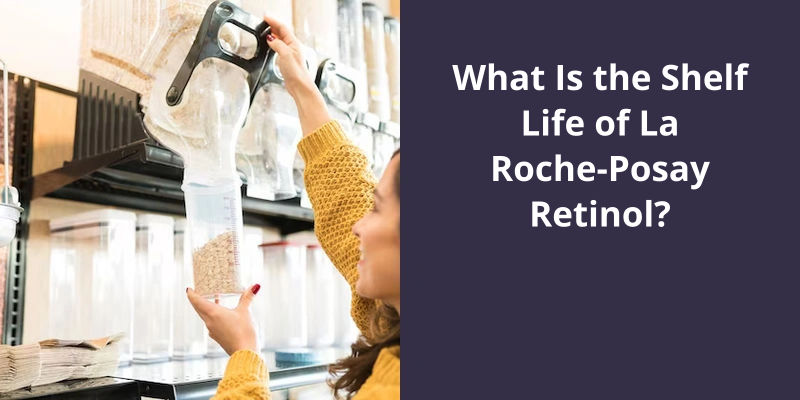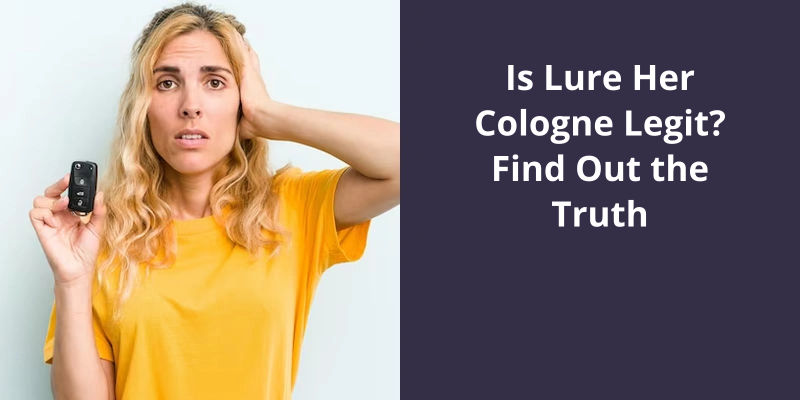The shelf life of La Roche-Posay Retinol, like most skincare products, will typically range between 1-3 years from the date of manufacturing. However, once the product is opened, it should ideally be used within 6-12 months. It is always essential to check the product packaging for its Period After Opening (PAO) symbol, which looks like a small opened jar with a number inside. This number signifies the recommended number of months the product is effective and safe for use after the first opening. To ensure its longevity, storing La Roche-Posay Retinol properly in a cool, dark place can be important as exposure to heat and sunlight can degrade the product faster.

Does La Roche-Posay Go Out of Date?
So, does La Roche-Posay go out of date? The answer is yes, but not before a considerable amount of time has passed. You can rest assured that you won’t need to worry about the products going bad anytime soon. Each La Roche-Posay product is formulated to maintain it’s efficacy for a certain amount of time, which is why the brand prints an expiration date on the package.
It’s important to take into consideration that the expiration date will depend on the batch of the product you purchase. Although this may seem like an inconvenience, it’s necessary to ensure that youre using the product for the best results and to avoid any harmful effects.
It’s also important to note that certain factors can affect the longevity of your La Roche-Posay products. Exposure to heat and humidity can speed up the degradation process, causing the product to lose it’s effectiveness faster. To ensure that your products last as long as possible, it’s best to store them in a cool, dry place away from direct sunlight.
Tips for Storing Skincare and Beauty Products to Extend Their Shelf-Life
Here are some helpful tips for extending the shelf-life of your skincare and beauty products:
1. Store products in a cool, dry place away from direct sunlight.
2. Keep products in their original packaging or airtight containers to prevent exposure to air and moisture.
3. Avoid storing products in humid environments like the bathroom.
4. Use a clean spatula or cotton swab to scoop out products rather than your fingers to prevent contamination.
5. Check expiration dates regularly and discard any products that have passed their use-by date.
Retinol is a popular anti-aging ingredient that’s gained a lot of attention in recent years. However, some people are concerned about it’s shelf life and whether or not it expires. Conventionally, most retinol-containing products tend to expire between 3 to 6 months of use. But does retinol really expire after 3 months? Let’s explore this topic further.
Does Retinol Really Expire After 3 Months?
Retinol is a popular ingredient in many skincare products due to it’s anti-aging benefits. However, the efficacy of the product decreases over time due to oxidation, exposure to air, and light. The expiry date is usually mentioned on the packaging, and it’s important to abide by it to ensure that the product is effective.
The packaging, handling, storage, and formulation are some key factors that can influence the stability of the product. Exposure to heat, light, and air can cause the retinol to degrade, thereby reducing it’s efficacy. To ensure that your retinol product works effectively, it’s imperative to store it in a cool, dry place, away from direct sunlight and heat.
When it comes to using retinol-containing products, it’s crucial to follow the instructions mentioned on the packaging. Using too much retinol or using it too frequently can cause skin irritation, redness, and flakiness. This is why it’s essential to start with a low concentration of retinol and gradually increase it over time. Additionally, it’s recommended to use retinol at night as it can make your skin more sensitive to the sun.
It’s important to note that not all retinol-containing products have the same shelf life. Some signs that indicate that the retinol has expired include changes in color, consistency, and texture.
How to Properly Store and Handle Retinol-Containing Skincare Products to Maximize Their Efficacy and Shelf Life.
Retinol-containing skincare products should be properly stored and handled to ensure maximum efficacy and shelf life. Store them in a cool, dark place away from sunlight and heat and make sure the lid is tightly closed to prevent air and light from entering. Use them within the recommended time frame and avoid exposing them to air and heat for prolonged periods.
It’s important to keep track of when you first opened certain skincare products, as they can expire and lose their effectiveness over time. While some products like sunscreen can last for a few years, others like retinol have a shorter shelf life of around six months after opening. Similarly, mascara should be replaced every three months to avoid bacteria buildup. So how can you tell when your products have expired?
How Long Can You Use Retinol After Opening?
Retinol, a powerful anti-aging ingredient, has become increasingly popular in recent years. It’s often recommended by dermatologists as an effective way to reduce fine lines, wrinkles, and other signs of aging. But how long can you use retinol after opening? The answer is around six months. This is because retinol is a highly active ingredient that can lose it’s potency over time. After six months, it’s recommended to replace your retinol product with a new one to ensure maximum effectiveness.
Mascara is another beauty product that’s a relatively short shelf life. Typically, mascara should be replaced about every three months. This is because mascara is a breeding ground for bacteria and other microorganisms, which can cause eye infections and other health problems. Additionally, mascara can dry out and become clumpy over time, making it less effective at volumizing and lengthening your lashes.
Sunscreen is an essential product for protecting your skin from harmful UV rays. However, many people are unaware of how long sunscreen can last after opening. However, it’s important to note that this can vary depending on the specific sunscreen product. Some sunscreens may only last for a year or less, so it’s always important to check the expiry date before using a sunscreen product.
In addition to sunscreen, other skincare products can also have expiration dates. Moisturizers, for example, can last anywhere from six months to two years, depending on the specific product. It’s important to keep in mind that using expired skincare products can be harmful to your skin and may not provide the desired effects. It’s recommended to regularly check the expiration dates on your skincare products and replace them as needed.
Overall, it’s essential to be aware of the shelf life of your beauty and skincare products. Always check the expiration date before using a product and replace it as needed to ensure maximum effectiveness and safety. By practicing good hygiene and regularly replacing your beauty products, you can keep your skin looking healthy and radiant.
How to Properly Store Beauty and Skincare Products to Prolong Their Shelf Life
- Always check the expiration date on the packaging before purchasing a product.
- Keep your beauty and skincare products in a cool, dry place away from direct sunlight and heat sources.
- Store products in their original packaging or in airtight containers to prevent air and moisture exposure.
- Wash your hands thoroughly before using any product to avoid contamination.
- Avoid storing your products in the bathroom as the humidity and temperature fluctuations can reduce their shelf life.
- Make sure to keep your products organized and properly labeled for easy access.
- Dispose of any expired products or products that have changed in texture, smell, or color.
It’s important to be aware of the shelf-life and usage guidelines for any sunscreen product in order to ensure it’s effectiveness and protect your skin from harmful UV rays. La Roche Posay sunscreen, for instance, has a shelf-life of 3 years and should be used within 12 months of being opened. This information can help you make informed decisions when purchasing sunscreen products and keep your skin safe and healthy.
How Long Does La Roche Posay Sunscreen Last For?
La Roche Posay is a well-known brand in the skincare industry that’s been offering high-quality sunscreens for many years now. One of the most common questions that customers ask when purchasing La Roche Posay sunscreen is about it’s lifespan. It’s important to know how long the product will last before it expires to ensure that it will be effective in protecting your skin from the harmful effects of the sun.
According to La Roche Posay, their sunscreens have a shelf-life of three years. This means that you can store the product for up to three years without worrying that it will expire or lose it’s effectiveness. However, it’s important to note that the three-year shelf-life applies only to unopened products. Once you open the sunscreen, the clock starts ticking, and the countdown to it’s expiration date begins.
After you’ve opened your La Roche Posay sunscreen, it’s recommended that you use it within 12 months. This is because the products effectiveness may start to diminish after this period, making it less effective in protecting your skin from the harmful effects of the sun. Therefore, it’s vital to keep track of when you opened your sunscreen to ensure that you’re using it within the recommended timeframe.
The lifespan of the product may vary depending on factors such as how often it’s used, the conditions in which it’s stored, and even the formulation of the product itself.
Additionally, the lifespan of the product may vary depending on several factors, so it’s always important to monitor it’s effectiveness and discontinue use if necessary.
In addition to the potential dangers of using expired skincare products, using expired retinol can also be ineffective. As retinol ages, it can lose it’s potency and ability to deliver the intended benefits to the skin. So, how can you tell if your retinol is expired and no longer effective? Here are a few key things to look out for.
How Do You Know if Your Retinol Is Expired?
Retinol is a popular and powerful ingredient in many skincare products. It’s known to help reduce the appearance of fine lines and wrinkles, and boost skins overall radiance and texture. However, like all skincare products, retinol has a shelf life, and it’s important to know how to tell if your retinol is expired. Using expired retinol can cause skin irritation, redness, and may not be as effective as fresh retinol.
Fresh retinol is typically smooth and creamy, whereas expired retinol may be lumpy, grainy, or even runny. Additionally, if your retinol feels sticky or tacky when you apply it, it may have lost some of it’s potency. These changes in texture can be a sign that your retinol is no longer effective and should be replaced.
Fresh retinol usually has little to no scent, while expired retinol may have a chemical or rancid smell. This is due to the breakdown of the retinol molecule over time, which can produce an unpleasant odor. If your retinol smells different than when you first opened it, it may be time to throw it out.
In addition to changes in texture and scent, expired retinol may also have a different color. This is due to oxidation, which breaks down the retinol molecule and can cause the color to change.
However, if you do experience any negative side effects, it’s important to stop using the product immediately and replace it with fresh retinol.
By paying attention to changes in texture, scent, and color, you can ensure that you’re using fresh and effective retinol to help keep your skin looking it’s best. Always remember to check the expiration date on your products and replace them if necessary.
How to Properly Store Retinol to Prolong It’s Shelf Life
- Store retinol in a cool, dry place.
- Avoid exposure to light and air.
- Keep retinol away from heat sources.
- Store retinol in it’s original packaging or in a dark glass container.
- Don’t store retinol in the bathroom or in the car.
- Check the expiration date before using retinol.
Conclusion
The longevity of the product ensures that users can enjoy it’s beneficial properties without worrying about it’s expiration date, which is critical when investing in skincare products. Additionally, by storing the product properly, individuals can prolong it’s shelf life and ensure that it remains effective for an extended period.





